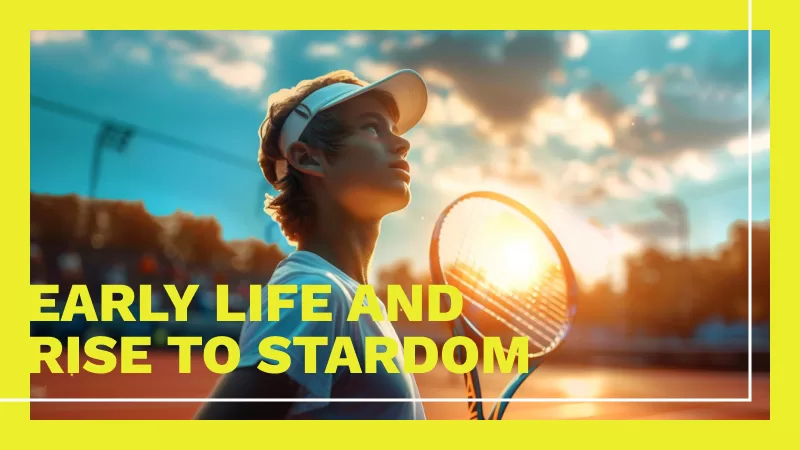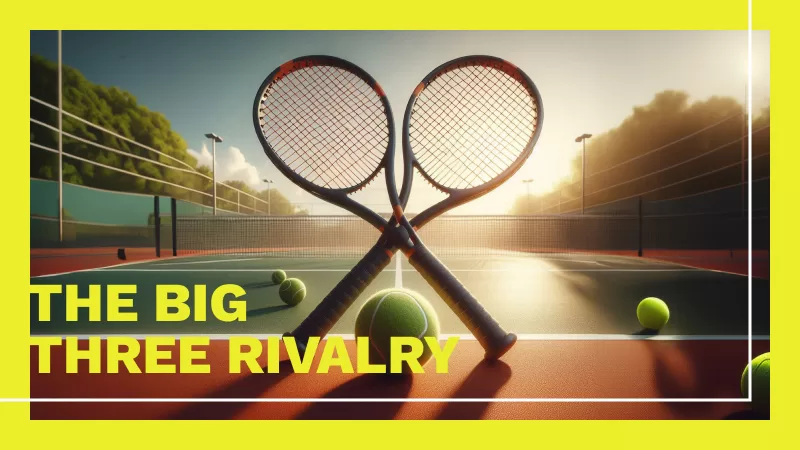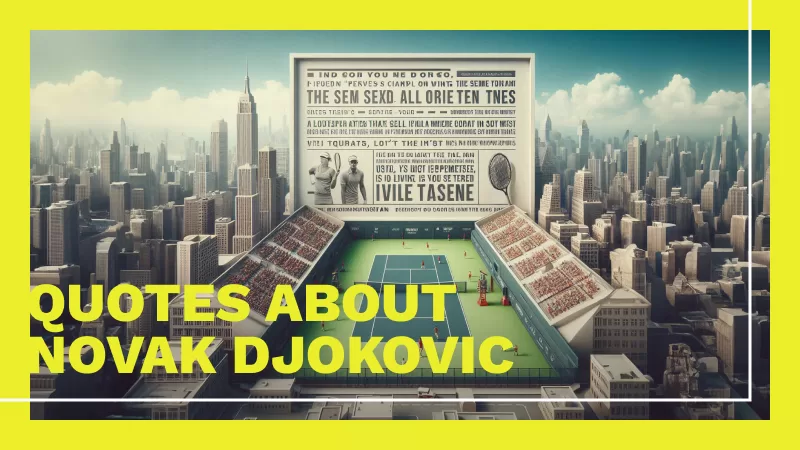In the grand hall that is sporting greatness, Novak Djokovic’s name forms precious Venetian glass – words that resonate with the modernity of tennis. The story of Djokovic is the fairytale from a war-torn Belgrade to the pinnacle of global tennis. 23 grand slam titles, myriad ATP final wins and one unyielding determined of mind later – this soon-to-be hall-of-famer has indeed changed the sport forever. With his unparalleled fight, speed, and headserene under pressure, Djokovic has not only put away the likes of Rafael Nadal and Roger Federer but also consistently redefined greatness.
Djokovic at Wimbledon (2018) via Radiosport Djokovic at Roland Garros (2021) via Getty Images Djokovic at Australian Open (2020)…medium.comTrue all-roundedness in tennis has seldom been displayed as well as what we see with Djokovic today. From his titanic battles with Nadal on the Paris clay, to his dramatic triumphs against a verdant backdrop at Wimbledon, Novak Djokovic’s career has been underlined by a tenacious steel and an unquenchable thirst for victory. In our search to find out Novak Djokovic,his life and reputation we have been essence of a player only giving away tennis but making history in the sports world.
Early Life and Rise to Stardom

The Early Life: Novak Djokovic was born on 22 May 1987 in Belgrade, Serbia. Having lived through the Yugoslav Wars, which included NATO bombings and economic difficulty during his youth. Amid all these obstacles, Djokovic started to find shelter and became passionate about tennis. His parents, soon knowing his potential supported him wholeheartedly in training and growing.
Djokovic’s first brush with tennis came at the age of four when he spotted a tennis camp being held near his family’s pizza parlor. A kid intrigued by the game, Novak started off with a run around using hit-crafted equip. It was soon obvious that he possessed natural ability, and at just 6 years of age, he began working with Jelena Gencic, a former Yugoslav tennis player. Genčić recognized raw talent in Djokovic and helped formative years of his career.
Djokovic moved to Germany at 12 (Photo:- Novak Djokovicmadefirstbiggestmove, aged 12)He trained under former Croatian tennis player Nikola Pilić at the renowned Pilic Tennis Academy. This was a huge turning point in his career. Genealogically, Djokovic trained in Germany because of the superior training facilities and coaching staff that allowed him to hone his skills and take part in more challenging matches. At the junior level, he achieved some of the most significant results in his career, winning, among other things (more)
Djokovic, who turned pro in 2003, shot up the world rankings faster than just about anyone ever. He reached the top 20 of the ATP Rankings in 2006, and by 2007, he had won his first ATP Masters title in Miami. He went on to win his first grand slam title at the 2008 Australian Open, beating Jo-Wilfried Tsonga in the final of that tournament. His win here marked the start of his complete control over tennis and put his name firmly among the contenders for the biggest titles in world sport.
Grand Slam Dominance
Just Take A Look At Djokovic’s Grand Slam Record As of 2024, he has captured a total of 23 Grand Slam championships in the course of his giant career. We’ve broken them down for you, tournament by tournament.
The Australian Open is Djokovic’s most successful Grand Slam tournament No player in the Open Era has won more Australian Open titles than him, with 10 of them. No other man has enjoyed the kind of fling Djokovic does every January in Melbourne, on hard courts that he claims as his Kingdom; to be able to play at a level close to perfection – year after year – in the intense Australian summer is ample proof of his physical and mental topman prowess, Period. Among his notable victories a little later he won his 2012 final against Rafael Nadal, the one I always link as one of the greatest ever to be played.
Historically, Roland Garros (the French Open) has been the stomping ground of the “King of Clay,” Rafael Nadal. Yet Djokovic has built a legacy of his own on the terre battue in Paris. This is expressly the reason as to why his first French Open championship in 2016, when he won his career Grand Slam, was such a treat. Ending Nadal’s regime, this win was especially important for it demonstrated Djokovic could take his game to another kind of surface. In 2021 and again major in 2023, he won his second and third French Open titles, confirming him as a versatile champion.
Djokovic has won Wimbledon seven times, the most of any Grand Slam. But his game suits the low, fast grasshell (sometimes that reads wrong in America), surfaces of Wimbledon. He successfully defended his Australian Open title for a record-extending eighth time in 2020. Still, he faced late heartbreak again in the final, where Novak saved match points against him to win – a reverse fate of their epic 2019 final. A leading example of Grass court tennis, His seven Wimbledon titles show his ability to handle pressure.
The US Open: Djokovic has won three more titles at Flushing Meadows. That the sweltering summer heat of New York has brought out his mental fortitude and physical endurance is no small part of the victories he has earned here. Both of his victories were rather dominant, reaffirming his title as a hard-court maestro, especially for an all-time great.
Djokovic employs a very important playing style with his incredible return of serve, movement (specifically how flexible he is at the drop of a hat and the way that he pops up out of sprints), and mental toughness. He reads the game well, and his anticipation of his opponents helps a lot to give him an advantage. From his defensive abilities to baseline aggression, Djokovic brings it all together in one package.
The Big Three Rivalry

Perhaps the most interesting thing to observe about Djokovic’s career is his fierce rivalry with Rafael Nadal and Roger Federer, commonly referred to as the “Big Three.” Pushing each other to reach new peaks, this trio has rewritten modern tennis and taken the sport’s appeal global. What defines the rivalry among Djokovic-Nadal-Federer is the head-to-head records Djokovic holds against both.
Djokovic and Nadal have dueled in many unforgettable matches, mostly on the clay of Roland Garros. Even though Nadal has been one of the most dominant in clay court history, Djokovic can still name multiple victories over Nadal as one more proof for how much diversity and mental strength Novak possesses. Highlight: Their battles – the 2012 Australian Open final, the 2021 French Open semifinal – have become touchstones in tennis lore for their mixture of battle-rap intensity and world-beating quality.
However, Federer is a completely different beast. Arguably the most memorable matches of this or any preceding age, between Federer and Djokovic in their differing styles — elegance versus baseline precision. Remember the 2019 Wimbledon final when Djokovic survived match points to win one of the longest finals of all time? Djokovic will always be asked about them, because they have lain the cornerstone of his career but also raised the profile of tennis, attracting millions more fans and inspiring generation after generation of young players.
These rivalries have forged not only some of the best matches in tennis history but in their own way, have shaped Djokovic into the player we see today. His wins over Nadal on clay, twice, and Federer on grass really highlight his all-court game and fight camp.
Beyond the Court
Novak Djokovic is a man of many sides, on and off the court. He is a dedicated family man and can be frequently found sharing moments with his wife, Jelena, and his two kids as well. His hobbies include meditation, spirituality, and exploring different foods and cultures. Djokovic keeps his professional and personal life in balance better than any other player, writes Dill.
Philanthropy is as big a part of Djokovic’s life. The Novak Djokovic Foundation, founded in 2007, centers its efforts on the creation of preschool programs with the mission to make sure all Serbian children and children around the world have equal access to early childhood development opportunities. The Djokovic foundation has helped to fund quite a few endeavors, such as the construction of schools and financial backing of educational programs.
But the road hasn’t been easy for Djokovic. His comments regarding vaccines in the wake of the COVID-19 pandemic and his role in organizing the ill-fated Adria Tour earned widespread condemnation. Moreover, his frequent on-court outbursts and confrontations with tennis authorities have only muddied the already murky waters surrounding his public persona. That armor was still not great resistance – Djokovic’s weapons are still equally formidable as his defenses, if anything, they are even better and stronger.
The Djokovic Diet and Training Regime

Behind the scenes of his successes, Djokovic has been somewhat meticulous about his diet and fitness. The gluten-free diet that helped Djokovic soar to new professional heights is no secret by now. His trainer and team of experts have created a diet that includes real food sources, proper hydration, and keeping his body in top form.
Your diet should be rich in highly nutritive, natural sources of fruits and vegetables combined with some lean proteins and fats, like the way Djokovic eats. He dodges gluten and dairy, as well as processed sugars, something that – he says has helped his energy levels and health. He has suggested that the diet, along with vigorous training, is what has helped him maintain his extraordinary agility and endurance on the court.
His own workouts are pretty full on as well, with cardio, strength training, stretching, and mental prep all featuring prominently. Djokovic routinely does yoga and meditates, a combination he says has helped him stay in the moments that get away from some and made him more unbreakable. All of these are reasons his trainers stress the recovery-based treatments (like cryotherapy and massage) to keep him running in top form. Djokovic’s methodical approach to health and fitness is clearly working out for him as he graduates from his competition at the age of thirty well.
Novak Djokovic’s Legacy
Novak Djokovic has had a profound, wide-ranging effect on tennis. He has raised the bar in the sport, pushing boundaries and breaking records which reflects his commitment to striving for excellence. Djokovic has won 23 Grand Slam titles — including at least twice in each of the four majors — to secure his place among the all-time greats in tennis.
Putting Djokovic in context with fellow tennis legends, including Federer and Nadal, calls attention to his peculiar impact on the game. In many ways, Federer is praised for his fluid ease and Nadal for his brute force, Djokovic, meanwhile, has established a reputation as one the greatest returners in the history of the game along with an absolute brick wall of mental aptitude. What distinguishes him is the attribute of being able to shape his game based on conditions and opponents.
His best days are not completely behind him yet either, with Djokovic having been in imperious form in 2018. And still, as he moves towards goals and puts more shine on his significant collection of silverware, the fans and planks are curious to see what comes next. His impact reaches further than what he was able to accomplish in tennis as it also motivates the future players of tomorrow to dream big.
In summary, the path of Novak Djokovic from a little boy in the basement of Belgrade to a tennis titan reads as an extraordinary talent, relentless determination, and unflinching will. His Grand Slam success, combined with his play and style, easily made him one of the true greats of the game. As fans and followers, we can only celebrate many more games, sets, and championship points remaining to be won together with the certainty that from now onwards, Novak Djokovic will always go hand in hand with Tennis greatness.
Novak Djokovic in Numbers
On the face of it, the raw Novak Djokovic career win-loss stats are truly awesome. Take a lengthy tour of some of the most important statistics in his career
Grand Slam Titles: Djokovic has won 23 Grand Slam titles as of June 2024. 10 Australian Open (hard court), 3 French Open at Roland Garros, 7 Wimbledon (grass) and 3 US Open (hard court). The Viking of Tennis has accomplished arguably the single most balanced player on all three surfaces with titles at Wimbledon, Roland Garros, and YEC while not divulging in particular when his skill shined the most over onto certain surfaces.
ATP Titles: Djokovic has won 94 ATP titles beyond the Grand Slam. This impressive total illustrates his sustained excellence on the ATP tour and underpinning his reign as a top player for over a decade.
Weeks as World No 1: Djokovic has spent a record 390 weeks as World No 1. This incredible feat highlights just that, and that is his continued dominance and marketability in the sport for an impressive amount of time. Vs. Major Rivals H2H Records: Djokovic is one of the most successful players against both Rafael Nadal and Roger Federer. Overall, he has a winning record against both of them — defeating Nadal 30 times to Nadal’s 20 victories and Federer 27 times to Federer’s 14 wins. Now when Bill Russell Cano compares his head-to-head stats with him, they form a huge part of his legacy: consistently getting a leg up on the supremely talented.
Total Prize Money: Djokovic has made more than $160m through prize money in his career. The total not only illustrates his on-court achievements but also provides evidence of how big of a drawing card he continues to be in tennis.
They tell the story of a great champion who has controlled tennis more than almost anyone else in history.
Quotes About Novak Djokovic

Novak Djokovic is more than just numbers. Below, we take a look at some of the wisdom Djokovic himself has said and quotes from his peers, coaches, and tennis legends that give insight into who he is and how he got there:
And your belief for as long as you can remember?Novak Djokovic: I’ve always been very confident in my own abilities. I know what I can do and how hard I work when necessary. I get to show myself once more through every challenge.
It is always a good challenge to face Novak. – Rafa Nadal (@RafaelNadal)ietfBNZpLs He makes you play your best tennis and pushes you to the very limit – His ability to battle and adapt makes him one of the more difficult opponents on tour.
Roger Federer: “Novak has taken it to a completely different level of athleticism and intensity. He has this knack of getting back shots that should never be returned and turning his defense into offense. He really has raised the game.
Marian Vajda (Djokovic’s longtime coach): “Novak has the best work ethic one could ask for. He never stops searching to get better and different ways of achieving his goals. Not many players are at his level of mental toughness and strategic thinking.
John McEnroe (Tennis Great): ” Djokovic is an all-around. He has no weaknesses in his game, and he is so strong mentally. He’s one of the all-time athletes, not just in tennis, but in sports.”
All of these quotes speak to the esteem and respect Djokovic has within the tennis community, which again speaks to his impact as a player and person both on and off the court.
Conclusion
Novak Djokovic career and accomplishments summary That journey from Belgrade to the most successful era in tennis history is one of prodigious talent and grit. Djokovic legency in tennis is established with 23 Grand Slam titles, numerous ATP victories, most weeks as World No.
But quantitatively, only very few can come close to achieving what Djokovic has but his real impact runs much deeper than that. With his indefatigable spirit, work ethic and love of the game, he inspired people around the world. Rivalries between the three players have marked an era in men’s tennis and also produced some of the most captivating matches ever played. He has been a role model for aspiring tennis players all over the world, both on and off the court with his philanthropic work outside of tennis and personal integrity.
Going forward, the career of Djokovic shows no probability to a halt. Fans and experts alike wait in anticipation to see what records he will break and titles he will win as he continues to compete at the highest level. His story represents how with determination and the will to be better one can achieve anything. Now that we see the dust settling on his influence and as we try to assess just what we have lost in terms of his effect and legacy, one thing is for certain: Novak Djokovic it not just a tennis player; he is a tennis colossus.
